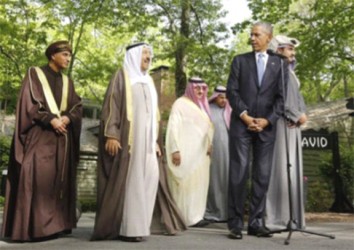CAMP DAVID, Md., (Reuters) – President Barack Obama vowed yesterday to back Gulf allies against any “external attack,” seeking to reassure them of Washington’s iron-clad commitment to their security amid Arab anxiety over U.S.-led efforts to reach a nuclear deal with Iran.

Hosting the six-nation Gulf Cooperation Council for a rare summit at Camp David, Obama pledged that the United States would consider using military force to defend them and would also help address Iran’s “destabilizing activities in the region.”
“I am reaffirming our iron-clad commitment to the security of our Gulf partners,” Obama told a closing news conference at the presidential retreat in the Maryland mountains outside Washington.
Obama stopped short of offering a formal defense treaty that some Gulf countries had sought and instead announced more modest measures, including helping them to integrate ballistic missile defense systems, streamlining weapons sales and increasing military training.
With the United States and five other world powers facing a June 30 deadline for a final deal with Iran on curbing its nuclear program, Obama also sought to allay Gulf Arab fears that the potential lifting of international sanctions on Tehran would embolden it in the region and increase the risk of it fueling more sectarian strife.
Differences over U.S. policy toward Tehran, Syria’s civil war and the Arab Spring uprisings loomed over the meetings, which were already clouded by the absence of most of the Gulf’s ruling monarchs, who instead sent lower-level officials.
Saudi King Salman pulled out, sending Crown Prince Mohammed bin Nayef and Deputy Crown Prince Mohammed bin Salman in his place in a move widely interpreted as a snub that reflected Gulf frustration with the Obama administration.
The White House insisted that such decisions were not intended as slights and portrayed the summit as more than just a symbolic event, though U.S. officials made clear in advance that major breakthroughs were not expected.
OBAMA’S BALANCING ACT
After flying in by helicopter, Obama and the Gulf leaders got down to work in Camp David’s rustic cabin-like conference center. The GCC consists of Saudi Arabia, Kuwait, Qatar, Bahrain, the United Arab Emirates and Oman.
Obama sought to strike a balance between trying to ease Gulf Arab fears about his diplomacy with Shi’ite Iran, their regional arch-rival, and at the same time squeezing the oil-rich states to work together more in their own collective defense.
“The United States will stand by our GCC partners against external attack and will deepen and extend cooperation that we have,” Obama told reporters, with Gulf leaders standing by his side at the end of the talks.
But he then told a news conference it was a “two-way street” and Gulf countries, which have differences among themselves, must also cooperate among themselves. A summit joint statement showed the GCC states committing to develop a region-wide missile defense system, something Washington has long advocated.
However, Obama appeared to have gained little ground in his efforts to win Gulf Arab backing for an emerging Iran deal. The White House had hoped at least for a toning-down of any criticism. That would help convince a skeptical U.S. Congress it has broad backing in the region, where U.S. ally Israel stands as the most vocal opponent of Obama’s diplomatic effort.
The joint statement said the summit participants “emphasized that a comprehensive, verifiable deal that fully addresses the regional and international concerns about Iran’s nuclear program is in the security interests of GCC member states.”
But they stopped short of endorsing a framework nuclear deal reached early last month that envisages sanctions relief in return for curbs on Tehran’s nuclear program. The agreement aims to prevent Iran from developing an atomic weapon, although Tehran has always maintained its nuclear program is for peaceful purposes.
Sunni Arab leaders are concerned that lifting sanctions would give Tehran a cash windfall to increase funding to Shi’ite militias around the region, sowing further sectarian strife in volatile countries such as Syria, Yemen and Iraq.
The Saudis and other Gulf states have also been accused of fueling sectarian proxy wars involving their neighbors.
The United States also pledged to help the Gulf states beef up “maritime security” in the world’s most important oil routes, a clear reference to worries about recent Iranian actions.
Adding weight to those concerns, Iranian naval vessels fired what appeared to be warning shots over a Singapore-flagged vessel in international waters in the Gulf on Thursday, prompting the oil products tanker to flee to UAE waters, according to U.S. officials. The vessel safely reached a UAE port, its manager said.





